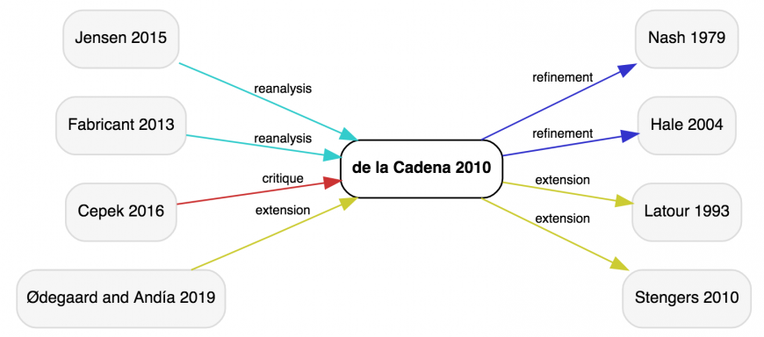
In a previous post on the SCA website, Relata is described as an experimental tool for collaborative indexing and exploratory search that seeks to map conversations within anthropological literature by identifying relations between scholarly works. Relata does this by identifying six types of relations: absence, critique, extension, incorporation, reanalysis, and refinement, and Relata users can add works and/or new relations by signing in with a Zotero, GitHub or Google account. The Relata project uses free and open-source software, and its metadata belongs to the public domain.
The tool is relatively easy to use—simply type the title or author of a published work into the search box in the top-right corner of the interface. Relata will return results based on relations identified and added to the database by other scholars through a list of citations on the left side of the screen, and a network map of these scholarly relations to the right side of the screen. One example of this network map is pictured below, focused around Marisol de la Cadena’s (2010) “Indigenous Cosmopolitics in the Andes.” Relata is a fundamentally collaborative tool, with scholars being able to add connections, add new works, and identify new relationships to other works in the database. Users can further add notes explaining the connections they have made, and why they fall into the categories of reanalysis, extension, critique, refinement, incorporation, or absence.

When I was introduced to the Relata project, I was interested by how this tool might reproduce or disrupt existing citational politics in this discipline. In conversations with Erin Gould (who contributed immensely to the development of this post), we were critical of how Relata’s potential to disrupt citational politics appeared to be largely dependent on which scholars had the time to actively contribute entries and identify connections. Given what we now know about gender disparities in publication rates during the COVID-19 pandemic (Vigliona 2020) and what we know about the amount of additional (and often unpaid) labor racialized and women scholars routinely undertake, we were concerned that those who would have the time to contribute to Relata were likely to be those who were always already the most privileged. This, we mused, might very well lead to the same citational practices which overrepresents the scholarship of our white, male colleagues and underrepresents the work of racialized, women, queer, and/or junior scholars.
With these concerns around citational politics in mind, Erin and I interviewed members of the Relata team, including Rodrigo Ochigame, Marcel LaFlamme, and Heather Paxson. Relata builds on the research and design of Ochigame, whose work seeks alternatives to dominant computational models and algorithms. Ochigame’s historical and ethnographic research on information retrieval systems and filtering algorithms as political forces inspired the design of Relata (Ochigame and Holston 2016; Ochigame 2020). Search tools like Google Scholar, Ochigame explained, regulate visibility based on the logics of popularity, similarity, and citational analysis. That is to say, when you search through a platform, your top results will be the most popular/most cited works. This means that women, queer scholars, and scholars of color are less likely to appear in your initial results because marginalized communities are rarely cited at the same rate as their white, male counterparts. Of course, these larger issues in citational politics are not new; Christen Smith and the Cite Black Women Collective, in particular, have been calling for an interdisciplinary re-evaluation of the politics of knowledge production and citational practices for years.
Ochigame noted that “information retrieval is political; we must build alternatives guided by different priorities.”
Relata is an effort to create alternatives to these forms of exclusion that are inherent to citational analysis. Ochigame described the project as a critical alternative to explicit citations—instead of finding the most popular works, or works similar to those you already know, Relata endeavors to return works that reflect critical and divergent perspectives on a given topic. Speaking from their own experiences, Ochigame explained how being involved as an activist in Brazil made the stakes of information retrieval and filtering algorithms palpable to them. During this time, they noticed that information about land struggles and land rights claims were not circulating on social media sites due to the filtering algorithms employed by sites like Facebook and Twitter, which are shaped largely by advertising priorities and metrics of popularity and similarity. Ochigame noted that “information retrieval is political;
we must build alternatives guided by different priorities.”
In speaking with LaFlamme and Paxson, they highlighted that the story of search and metadata often goes untold. Both LaFlamme and Paxson were involved in the redesign of the Society for Cultural Anthropology (SCA) website and worked on the search tool which integrated results from Cultural Anthropology (the academic journal) and Fieldsights (the online platform). The focus on integrated search and its limitations led them to consider how they might do searches differently. LaFlamme noted that “search is not magical.” Paxson elaborated, “one thing that happens with attention to citational politics is an alternative canon…[but] it can close off conversations as much as it opens [them] up. Relata is in the tradition of generating conversations that may be surprising…trying to proliferate results not just randomly but with a sense of critical citation studies in mind.”
The Relata project is designed to be a community tool. Ultimately, though, whether this tool disrupts or reproduces the citational politics that groups like the Cite Black Women Collective have critiqued will depend on who contributes to it. Our conversations with Ochigame, LaFlamme, and Paxson certainly highlighted this fact. LaFlamme located the project within the larger call for community-owned or community-controlled scholarly infrastructure: “people are trying to imagine alternative visions to scholarly infrastructure. Relata is part of that wider movement…we very deliberately built it to belong to the community…It’s part of the ecology that gave rise to the project.” Accountability and relationality were central theme of these conversations; developing relationships of accountability between the creators of the tool and the scholarly communities attempting to reimagine search and citation is crucial to the project. As a community tool, Relata will only be useful if the community invests in and holds both the tool and its creators accountable for what it does and does not yet do. In its current stage, Relata only supports works indexed by Crossref and with stable Digital Object Identifiers (or DOIs) and therefore excludes films and journals without DOIs. LaFlamme and Paxson identified this as one of Relata’s technical gaps and as a form of exclusion being enacted by the infrastructure the tool depends on. Crossref, of course, comes with some limitations – in particular, this system may currently exclude monographs, older works, and scholarship produced by independent scholars. Likewise, the need for stable DOIs currently excludes non-textual scholarly modalities like ethnographic films. The Relata team has worked to address these exclusions and is investigating ways to support a wider range of works in the face of technical challenges posed by the limited availability of open-access metadata.
How Can We Use Relata as a Teaching Tool?
As an instructor, I see a few keys ways in which Relata might be used in teaching or instructional support. Thinking specifically about the introductory first-year courses I teach, Relata might be useful in teaching about researching and writing essays because it offers an interactive and dynamic way of visualizing conversations between scholars or schools of thought. The mapping of conversations produces easy to follow visuals of how different papers and ideas build onto and off of each other. I often find myself trying to create graphics that do just that when I teach students how to build arguments for their essays in introductory anthropology courses. In our conversations about Relata, Erin and I talked about how we might supplement standard annotated bibliography assignments (which our students so often cast aside when it comes time to write anyways). Having students trace conversations between assigned readings through adding to the Relata database, for example, might be a way to reimagine how we approach the basics of research and writing in these introductory classes.
In my own classes this term, I have reorganized some of my lectures around visually mapping out conversations and connections between key figures in the anthropological canon, inspired by Relata’s network maps. Thus far, my students seem to be picking up these connections and remembering key figures and ideas with more ease, and I look forward to their feedback on this approach at the end of term.
Call to Action
I am keen to see how the Relata project develops and is taken up by our scholarly communities. That being said, I want to end this post on a call to action. This call is two-fold:
- Add to Relata. But—do not add from the canon. Add your alternative genealogies of anthropological theory. Add the scholarship of Black women, Indigenous women, and trans* and queer folks. Add critiques and reanalyses of the canon. Add those ethnographies that you get excited to introduce to your students every year. Map the conversations that matter to you and to your students.
- Tell us how you have used Relata in your classroom. If you have used the tool in your classroom, reach out to Teaching Tools or the Relata team! We would love to hear about your experiences so that we might highlight them in future posts.
References
Cite Black Women. n.d. “Our Story.” Accessed 3 November 2021. https://www.citeblackwomencollective.org/our-story.html.
Ochigame, Rodrigo. 2020. “Informatics of the Oppressed.” Logic 11, no. 1.
Ochigame, Rodrigo, and James Holston. 2016. “Filtering Dissent: Social Media and Land Struggles in Brazil.” New Left Review 99 (May/June).
Vigliona, Giuliana. 2020. “Are Women Publishing Less During the Pandemic? Here’s What the Data Say.” Nature 20. https://www.nature.com/articles/d41586-020-01294-9.